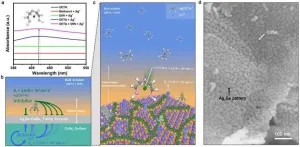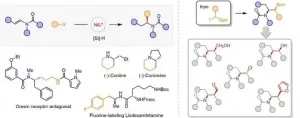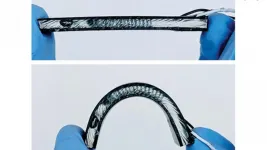New inhibitor found to combat drug-resistant cancer cells
2021-03-08
(Press-News.org) A new substance could improve the treatment of persistent cancers. Researchers at Martin Luther University Halle-Wittenberg (MLU) and the University of Greifswald have developed a new inhibitor that makes drug-resistant tumour cells respond again to chemotherapy. The new substance blocks a protein in the cancer cells that normally transports the cancer drugs back out of the cells. The results were published in the scientific journal Molecules.
In addition to radiation therapy, cytotoxic agents, also known as chemotherapy, are frequently used to treat cancer. They prevent cells from dividing and thus cancer cells are unable to multiply unchecked. "Cytotoxic agents remain a very important form of treatment because they have a general effect, in other words, they work on different types of cancer," explains Dr Andreas Hilgeroth, a professor of pharmacy at MLU. However, some tumours are resistant to chemotherapy. They possess certain proteins that transport the drugs back out of the cancer cell.
Hilgeroth's research group has now developed a new class of substances that inhibits one of these transport proteins: the multi-drug resistant protein 4 (MRP4). "It plays a particular role in leukaemia," says Professor Christoph Ritter from the Institute of Pharmacy at the University of Greifswald. The protein transports chemical messengers that appear to contribute to the development of that type of cancer. Ritter supported the team in the efficacy studies on special, drug-resistant cancer cell lines. The researchers were able to show that the cells treated with the new inhibitor transported fewer of the dye-labelled messengers and that the cytotoxic agents began having an effect again. "One of the substances showed particularly promising results," says Ritter, adding, it inhibited the protein much better than the best inhibitor known to date.
The new substances could have two simultaneously positive effects: "preventing the transport of cancer-promoting messengers and ensuring that the chemotherapy starts working again," explains Hilgeroth. If they prove to be successful in further tests, however, they will only be administrable in patients who have tumours containing the MRP4 transport protein. However, a pre-screening that uses markers to identify the type and characteristics of a specific cancer is already part of standard treatment. "There is an increasing focus on individualised medicine, especially in cancer therapy," says Hilgeroth. Drugs are used that are tailored to the type and characteristics of the cancer. A different inhibitor would then be used on a different transport protein.
The efficacy must now be confirmed in further preclinical trials. Researchers will try to establish how well the newly developed drugs specifically inhibit MRP4 in order to reduce side effects. If the substances are a success, several years of clinical trials will follow to confirm their efficacy in patients.
INFORMATION:
ELSE PRESS RELEASES FROM THIS DATE:
2021-03-08
In 1952, Alan Turing, the father of computer science and artificial intelligence, proposed that certain repetitive natural patterns may be produced by the interaction of two specific substances through the "reaction-diffusion" process. In this system, activator promotes the reaction and inhibitor inhibits the reaction. When the two meet, the reaction diffuses. When the difference in diffusion coefficient between the two reaches a certain level, the high diffusion ratio between them will cause the system imbalance and induce the formation of periodic complex patterns.
"Turing structure" exists widely in nature, such as the body patterns of zebras, the phyllotaxis of sunflowers, the follicle spacing of ...
2021-03-08
The precise choice of treatment for breast cancer depends upon the status of the hormone receptors (for oestrogen and progesterone). Their conventional determination by means of immunohistochemistry (IHC) is associated with a certain error rate, which can be reduced by adding genomic data. Even conventional statistics can bring about a notable improvement but now it is possible to use decision theory to optimally combine diagnostic findings, particularly where they are contradictory. This is the finding of a recent study conducted by MedUni Vienna under the leadership of Wolfgang Schreiner from the Center for Medical Statistics, Informatics and Intelligent Systems (CeMSIIS). The methodology has applications way beyond breast cancer and can be deployed ...
2021-03-08
Recently, research group, led by Prof. FU Yao and associate research fellow LU Xi From Hefei National Laboratory for Physical Sciences at the Microscale and School of Chemistry and Materials Science of the University of Science and Technology of China (USTC), has made significant achievements in the field of synthesis of chiral amines. They developed a mild and general nickel-catalysed asymmetric reductive hydroalkylation and realized the modular synthesis of chiral aliphatic amines.
Results were published in Nature Communications on Feb. 26, 2021.
Chiral amines are important chiral auxiliaries and key synthetic intermediates of pharmaceuticals and natural products. ...
2021-03-08
With the help of the European Southern Observatory's Very Large Telescope (ESO's VLT), astronomers have discovered and studied in detail the most distant source of radio emission known to date. The source is a "radio-loud" quasar -- a bright object with powerful jets emitting at radio wavelengths -- that is so far away its light has taken 13 billion years to reach us. The discovery could provide important clues to help astronomers understand the early Universe.
Quasars are very bright objects that lie at the centre of some galaxies and are powered by supermassive black holes. As the black hole consumes the surrounding gas, energy is released, allowing astronomers to ...
2021-03-08
Astronomers using the National Science Foundation's Karl G. Jansky Very Large Array (VLA) and Very Long Baseline Array (VLBA) have found and studied the most distant cosmic jet discovered so far -- a jet of material propelled to nearly the speed of light by the supermassive black hole in a quasar some 13 billion light-years from Earth. The quasar is seen as it was when the universe was only 780 million years old, and is providing scientists with valuable information about how galaxies evolved and supermassive black holes grew when the universe was that young.
The studies indicate that the quasar -- a galaxy harboring a black hole 300 million times more massive than the Sun -- has a jet of fast-moving particles only about 1,000 years ...
2021-03-08
COLUMBUS, Ohio - Multinational companies headquartered in countries with tougher environmental policies tend to locate their polluting factories in countries with more lax regulations, a new study finds.
While countries may hope their regulations will reduce emissions of carbon dioxide and other greenhouse gases, these results show that these policies can lead to "carbon leakage" to other nations, said Itzhak Ben-David, co-author of the study and professor of finance at The Ohio State University's Fisher College of Business.
"Firms decide strategically where to locate their production based ...
2021-03-08
North Carolina State University engineers continue to improve the efficiency of a flexible device worn on the wrist that harvests heat energy from the human body to monitor health.
In a paper published in npj Flexible Electronics, the NC State researchers report significant enhancements in preventing heat leakage in the flexible body heat harvester they first reported in 2017 and updated in 2020. The harvesters use heat energy from the human body to power wearable technologies - think of smart watches that measure your heart rate, blood oxygen, glucose and other health parameters - that never need to have their batteries recharged. The technology relies on the same principles ...
2021-03-08
Rome, Italy, March 8, 2021 - Allelica, a leading genomics software company specialising in developing polygenic risk scores (PRS) for personalised medicine, today announced publication of a study in Circulation (Vol. 143, Issue 10) showing that the effect of LDL cholesterol on a person's risk of having a heart attack depends on their genes. Using Allelica's proprietary PRS analysis software, the data showed that combining information on an individual's genetic risk of heart attack with their LDL level helps determine those at most risk from heart attack, including those potentially in need of treatment with statins or PCSK9 inhibitors. The PRS was also able to identify individuals eligible for therapeutic intervention based on current ...
2021-03-08
To avoid a substantial increase in water scarcity, biomass plantations for energy production need sustainable water management, a new study shows. Bioenergy is frequently considered one of the options to reduce greenhouse gases for achieving the Paris climate goals, especially if combined with capturing the CO2 from biomass power plants and storing it underground. Yet growing large-scale bioenergy plantations worldwide does not just require land, but also considerable amounts of freshwater for irrigation - which can be at odds with respecting Earth's ...
2021-03-08
Diphtheria - a relatively easily-preventable infection - is evolving to become resistant to a number of classes of antibiotics and in future could lead to vaccine escape, warn an international team of researchers from the UK and India.
The researchers, led by scientists at the University of Cambridge, say that the impact of COVID-19 on diphtheria vaccination schedules, coupled with a rise in the number of infections, risk the disease once more becoming a major global threat.
Diphtheria is a highly contagious infection that can affect the nose and throat, and sometimes the skin. If left untreated it can prove fatal. In the UK and other high-income countries, babies are vaccinated against ...
LAST 30 PRESS RELEASES:
[Press-News.org] New inhibitor found to combat drug-resistant cancer cells



